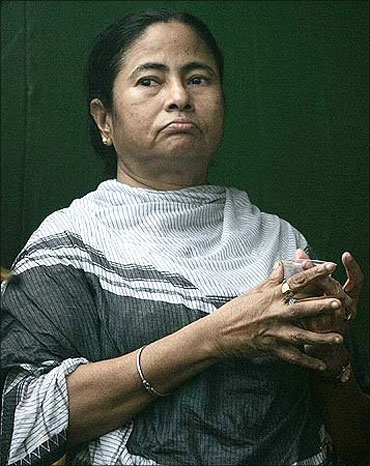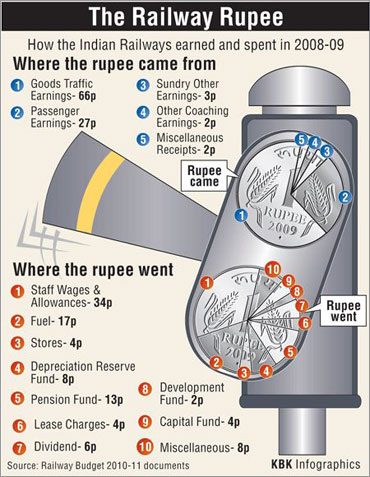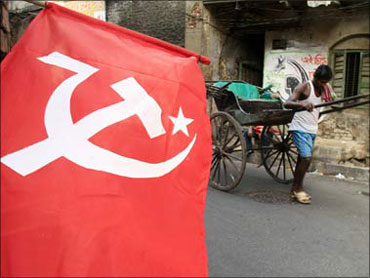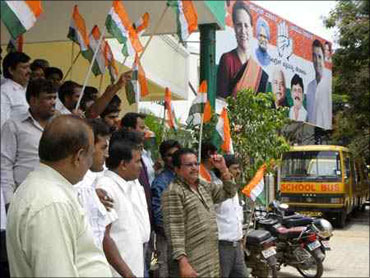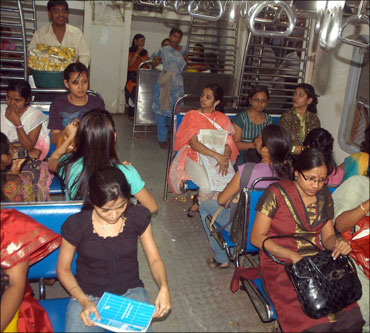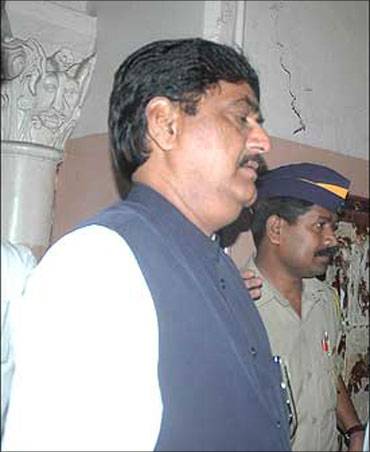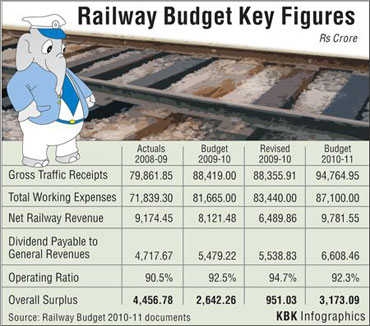 | « Back to article | Print this article |
Who praised Mamata, who slammed her
Opposition parties, including the Bharatiya Janata Party and the Communist Party of India, on Wednesday slammed the Rail Budget terming it a mockery while the Congress said the budget is futuristic and reflects the concerns of the 'aam admi'.
"The Railway Budget was a mockery. Railway minister has converted the entire exercise into a comic opera. It's a sad day for railway users and commuters. This budget has only Bengal and all others are left 'Kangal' (poor)," senior BJP leader Ananth Kumar told reporters outside Parliament after its presentation.
He alleged the budget had "nothing" and even those plans which were yet to get the Planning Commission's nod have been announced in the budget.
CPI leader Gurudas Dasgupta described the budget as "an exercise of utter madness" and alleged there was politics in the budget, which was also over-ambitious and unrealistic.
"The budget has been made with a political bias keeping in mind the upcoming West Bengal elections. This is not the way railway minister of the country should present the Rail Budget," Dasgupta said. His colleague D Raja also found "political intentions" behind the budget and doubted whether the promise of starting so many new trains could be fulfilled.
Who praised Mamata, who slammed her
Congress spokesperson Manish Tewari, however, strongly backed Mamata Banerjee's budget saying the budget was futuristic and a balancing act between immediate needs and long term plans.
Tewari also welcomed non-increase of passenger fares, saying, "From the aam admi's point of view there is no increase in passenger fare, which is most significant. It's the second budget in the UPA, without any increase in passenger fare."
Tewari said the railway minister has taken "bold steps" by addressing immediate concerns while juxtaposing them against long-term plans. He said the budget also talked about Vision 2020.
Tewari denied the Opposition charges that it was a West Bengal-centric budget and said it was difficult for any railway minister to balance the aspirations of all regions.
To a question on whether Banerjee ignored the reported advice of Prime Minister's Economic Advisory Committee for raising passenger fare instead of freight, Tewari said, "She must be having all inputs with her and must have evaluated everything."
Who praised Mamata, who slammed her
Samajawadi Party general secretary Mohan Singh alleged the railway minister had put old schemes in cold storage while announcing new schemes. "It's a non-serious railway budget," he said.
Supria Sule (NCP) also dismissed the Opposition charge that the budget was loaded in favour of West Bengal and welcomed it saying, "It will be unfair to say that she has favoured Bengal. She has tried her best to give every part of the country something."
JD(U) chief Sharad Yadav alleged there was nothing in the budget for northern India.
"The Rail Budget has nothing for northern India, no major north-bound trains have been announced. None of the pending projects have been completed. Several railway lines in northern India are metre-gauge, which should have been broad-gauged," he said.
Cutting across party lines, several Opposition party leaders said many projects announced by the Railway minister have not even been approved by the Planning Commission.
Who praised Mamata, who slammed her
BJP slams Banerjee for focusing on non-Railway work Criticising the Rail Budget presented by Railways Minister Mamata Banerjee, the Bharatiya Janata Party alleged she was cheating the people by announcing unapproved projects and focusing on non-railway work such as agriculture, medicine and social welfare.
"Her (Banerjee's) announcements in the Railway Budget are mostly related to activities of other ministries such as agriculture, education and medical, and not about more funds for new rail line, passenger amenities or modernization projects of Railways," BJP deputy leader in the Lok Sabha Gopinath Munde said.
"In her last year's budget too, her announcements were related to setting up of medical colleges and printing presses, which are not railway activities. This year too she has made announcements on social activities, 300 diagnostic centres, motels and parks. I think she is not focusing on railway's progress," Munde said at the Parliament premises soon after the budget was presented.
He said Banerjee was focusing on non-Railway activities such as setting up playgrounds, creches, hospitals and cold storages.
"It seemed as though she was reading out the railway timetable and not making a budget speech," he added.
Who praised Mamata, who slammed her
The BJP leader said if Banerjee had fulfilled the promises of social responsibility she made last year, her announcements this year could be believed.
"Not a single project announced last year has been fulfilled by her. So how do we believe her now?" he wondered.
Meanwhile, commenting on the Railway Budget 2010-11, Anand James, chief analyst, Geojit Comtrade, said: "Freight cut in kerosene and foodgrains follows government's efforts to keep inflation under check. A rise in freight would have come at a wrong time, when economic recovery faces several challenges."
"Laudable is the railway ministry's efforts to expand the revenue base from non core areas, especially so in the wake of 14,000 crore in investment envisaged in the next 10 years. This should ensure that pressure of increasing the revenue streams are not passed on to the passengers or to the commodities," James added.
"However, initiatives for new rails especially in areas of dense population like Kerala where fast highway development may not be feasible, has been below expectations," he added.
Who praised Mamata, who slammed her
Jay Shankar, chief economist, Religare Capital Markets Ltd, said in reactions to the rail budget that it was high on promise but low on action.
"Rail budgets and, for that matter, the railway ministry portfolio have traditionally been highly politicised, primarily because of the vast number of people employed in the sector and hence the large vote-bank involved," Jay Shankar said.
"To be fair, Rail Budget 2010 seems to be relatively low on regional politics (vis- -vis railways minister Mamata Banerjee's past track record and media speculation to the contrary). In that sense, it's a welcome change, even though the minister's home-state of West Bengal expectedly garnered a larger share of new projects and train introductions. Overall, however, the Rail Budget is full of good intent and vision, but ultimately succumbs to politico-economic realities," he added.
Vision 2020 -- a roadmap for future growth: "The most important announcement in Rail Budget 2010 is the formulation of a 10-year plan entitled 'Vision 2020'. This plan sets out a clear roadmap for growth and operations of the Indian Railways (IR). Even though many of the statements and targets in the Vision document appear to constitute a lofty wish-list, the broad intent and strategy outlined to take the IR forward are commendable. The demarcation of goals into short, medium and long-term timelines gives one the feeling of a well-discussed and debated thought process," he added.
PPP not privatisation: "The Rail Budget rightly realises the need to encourage private participation via the public-private partnership (PPP) route, given the resource crunch that the colonial-era body faces today. Outright privatisation has been ruled out, citing the twin factors of strategic importance as also the volume of employment generated by the IR," Jay Shankar added.
Who praised Mamata, who slammed her
"However, the minister did acknowledge the need for a new business model that involves more private initiatives, while preserving the ownership with the Railways. Further clarity on the nature of these PPPs would offer a better picture on order books of private companies."
"Political imperatives trump economic rationale: When it came to action, politics did prevail over economics. Passenger fares as well as freight rates were not increased, despite pressure from the finance ministry and the prime minister's office. In fact, the minister announced a marginal cut in freight rates on food grain and kerosene by Rs 100/wagon, and a reduction of Rs 20 per AC-class ticket. But with losses from passenger operations touching Rs 139.6bn in 2008-09, there is a clear case for pruning the level of cross-subsidisation between passenger and freight services by increasing the passenger fare."
"This would also make rail freight services more competitive, considering that its market share in this segment has been witnessing a steady decline," said Jay Shankar.
Some tall orders: "Some of the announcements appear to be tall orders, given the IR's bureaucracy and administrative sloth. These include the roll out of 1,000km of new tracks in FY11 (average for the last 50 years is less than 200km), formulation of a special task force to clear business proposals in 100 days, and plans to ensure that every rail crossing is manned in the next five years!" Jay Shankar further added.
Reaching for the stars?: "Overall, the Rail Budget is full of good intent and vision, sprinkled with politico-economic realities. The minister faces elections in her home-turf (West Bengal) within a year. As somebody famously said -- if you aim for the stars, you will at least get to the hilltop. Even if half of the intended policy announcements are implemented and targets achieved, the IR could see a dramatic transformation from a colonial era rail transport company to a modern and technologically upgraded, passenger-friendly rail transport organization," he said.
